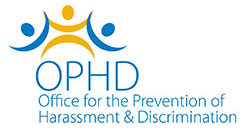Overview for Students
We have provided links to a wide variety of policies and procedures that students may find helpful. There are nondiscrimination policies that outline the university’s commitment to nondiscrimination and list the protected categories, such as race, sex, gender, religion, national origin, etc. For summaries of definitions of unlawful harassment and discrimination, please see the FAQ. There are also procedures OPHD uses to help resolve and investigate different types of complaints. For your convenience, we included links to the Principles of Community and to other policies and procedures, such as the Student Conduct Code and the Hearing Procedures for Alleged Sex Offense, Harassment or Discrimination Violations.
Policies and Procedures Related to Nondiscrimination
UC Policy on Nondiscrimination
Interim UC Policy on Anti-Discrimination (Effective January 2026) (Responsible Employee FAQs)
UC San Diego Procedures for Discrimination and Harassment Complaint Resolution PPM 200-23
UC San Diego Policy on Nondiscrimination in Course Prerequisites and Course Descriptions
UC San Diego Policy on Students with Disabilities and Steps for Academic Accommodation
Polices and Procedures Related to Sexual Violence and Sexual Harassment
Chancellor's Reaffirmation of UC San Diego's Policy on Sexual Violence and Sexual Harassment
Interim UC Policy on Sexual Violence and Sexual Harassment (Effective January 2026)
- UC Politica de Violencia Sexual y Acoso Sexual
- 加州大學 – SHSV 政策
- Sekswal na Kaharasan at Sekswal na Panliligalig
UC San Diego Policy for Reporting and Responding to Sexual Violence and Sexual Harassment PPM 200-19
Policy on Student Conduct and Discipline (PACAOS 100.00)
Written Notice of Reporting Options, Rights & Resources for UC San Diego Students
Additional Policies
UC San Diego Principles of Community
UC Policy on Gender Recognition and Lived Name
UC San Diego Policy on Conflicts of Interest Arising Out of Consensual Relationships PPM 200-11
UC Policies Applying to Campus Activities, Organizations and Students
Statement Regarding Discrimination and Harassment, UC San Diego General Catalog
UC San Diego Student Code of Conduct
UC San Diego Policy on Speech, Advocacy and Distribution of Literature on University Grounds
You can make a complaint of unlawful harassment or discrimination — or simply make an appointment to find out more information — by contacting OPHD.
- (858) 534-8298
- ophd@ucsd.edu
You can also make a complaint online by using the Report Bias page.
If you want to make a complaint, OPHD can assist you either by
- Helping to resolve the matter informally.
- Doing a formal investigation. OPHD investigates by interviewing the parties involved, including witnesses, and evaluates available evidence. OPHD then determines whether the evidence supports a finding that university policy has been violated and issues a written report with the investigative finding. The university administrator responsible for determining an appropriate action or discipline receives the report. The proper administrator may be a College Dean, Provost, Vice Chancellor, Student Conduct Officer, supervisor or other administrator, depending on the allegations and finding.
There is no prescribed sequence — choosing a formal or informal option — so choosing one option first does not prevent a complainant from choosing a different option for resolution later on.
Alternatively, students may also file complaints with the U.S. Department of Education Office for Civil Rights.
Electronically through https://ocrcas.ed.gov/index.cfm or ocr@ed.gov
By mail at: U.S. Department of Education Office for Civil Rights, Lyndon Baines Johnson Department of Education Building, 400 Maryland Ave., SW, Washington, DC 20202-1100
By phone at: (800) 421-3481, 800-877-8339 (TDD)
Or through the Department’s San Francisco Office: (415) 486-5555, or ocr.sanfrancisco@ed.gov.
A student found in violation of a university policy may be subject to sanctions such as a formal warning, targeted educational programs, exclusion from areas of the campus or from university-supported programs or activities, restitution, probation, suspension, revocation of awarding of degree, dismissal or other sanctions.

